Back when Umbro helped set the standard in global soccer culture, and back when print ads still mattered, there was a memorable one produced by the English outfitter that featured four children playing pickup on a street bathed in shadows created by a highway overpass. It looked like a dirty, dangerous place for kids to play but a poignant place to live their love for the game.
The tagline read, “99.99997% of the world plays without a contract.”
Going pro, becoming a star, or reaching a World Cup is, almost by definition, about beating the odds. Every player who takes the field in Qatar this month has defied probability. And many surely can identify with those young athletes in the ad. But Canada’s Jonathan David may be unique, because his story is about more than just beating the odds. It’s about embracing them, lengthening them and then betting big on himself to triumph, anyway.
“Yeah, I realize how incredible it is. But I don't even think about that. I hardly sit down and reflect on how far I've come,” David, 22, says of his journey. “Five years ago I wasn’t even a pro. Now I'd love to play in a World Cup, which is like, ultimately, the dream of all players that are pro. It’s crazy to think.”
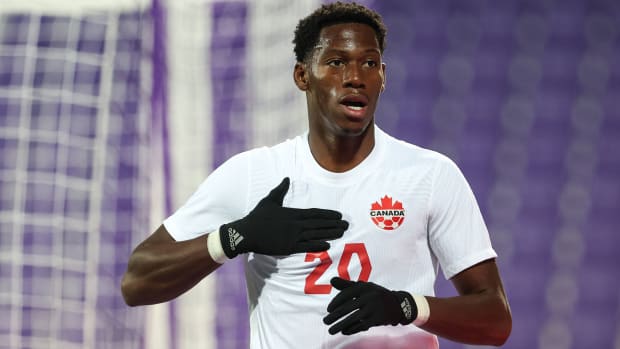
Armin Rauthner/GEPA Pictures/Imago Images
Five years ago, David was playing for his youth club, Ottawa Internationals. Even getting that far was a relatively low-percentage play. He was born in New York City while his Haitian parents were in the U.S. visiting family, and he returned to Port-au-Prince as an infant. The World Cup couldn’t have been further away at that point, and it didn’t get a whole lot closer when David and his family immigrated to Ottawa in 2006 (he says his godfather was their connection to the Canadian capital). At that point, around 10 years after that Umbro ad ran, Canada hadn’t escaped Concacaf qualifying in two decades. Its men’s team ended ’06 ranked 82nd in the world. Toronto FC was a year from kicking off and the country boasted next to no developmental infrastructure. David, who was raised in the Ottawa suburbs, played rec soccer before joining a club called Gloucester Hornets as an 11-year-old.
His World Cup odds were probably around 0.00003%.
“I think I always liked soccer. So no matter what I was always going to play,” David recalls. “When I was growing up, I played every sport in school. I always participated in every sport. [But] I think playing soccer is what got me making friends, you can say. So you’re playing soccer together then you just started talking and after that, that’s what happens. You meet new people.”
He was a boy playing with his mates like millions of others on the distant periphery of the game, but there were a couple of notable accelerants in his favor. One was the combination of David’s obvious talent and the rare composure, calm and confidence that remains at the core of his personality. It’s why Canada coach John Herdman starting calling David “Iceman.”
“He’s just so cool and calm—doesn’t say much, got this demeanor that nothing fazes him. Killer instinct, but no expression to it,” Herdman told TSN a couple of years ago.
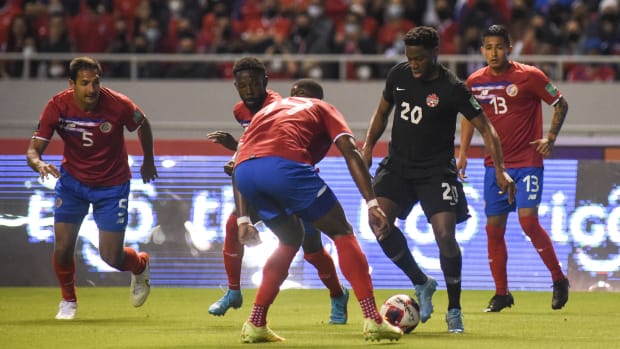
Jose Campos Rojas/PME/Imago Images
The soft-spoken David’s other asset was a small but nurturing and ambitious support network, anchored by his parents, supporters willing to help with training expenses and a coach he met at Gloucester, Hanny El-Magraby. The coach and his protégé stayed together, even as they changed clubs, and kept their eyes fixed firmly on Europe. An MLS academy seemed like the quickest path to the pros, and they became familiar with David as he started to make his mark with provincial and junior national teams. But Montreal, Toronto or Vancouver were never the goal, even though Europe might have been more accessible with that MLS springboard.
“I think I got a bit lucky to be fair, because when I first registered for my first club team in Ottawa, [El-Magraby] was someone that wanted to build players and make them better so they could go play in Europe,” David explains.
“At some moments I was tempted [by MLS], because I was also interested to see what it’s like to be in that environment every day,” he adds. “But of course my coach was always reminding me, ‘Remember in the beginning when we said the goal was to go to Europe? So stay focused. Even though it can be good [in MLS], don't get distracted by this.’”
El-Magraby and David’s agent, Nick Mavromaras, helped arrange trials with VfB Stuttgart and Red Bull Salzburg before reaching a deal with KAA Gent, a team that typically finishes in the top half of the Belgian Pro League. David trained with the Buffalos before becoming eligible to play upon turning 18 in January 2018, and then scored on his first-team debut eight months later. Gent comes from a small city and is a far cry from the European elite. But it’s a step in that direction.
“He had a great support network in Ottawa, people who just kept him grounded and supported him in those training environments he was in,” Herdman said during a recent conference call.
“He never had that love of the game knocked out of him as a youngster. He’s been allowed to enjoy a pretty visceral experience of football without the pressures of academy football and all the things that come with that,” the national team coach continued. “So I think it just shows there’s a lot of pathways to the top in football, and Jonathan had a real solid support network. And from what I can see he just loves the game. He’s always watching the game. If he’s not playing FIFA in the environment with his mates, he’s talking about watching a game, or he’s on tactical architect meetings with the coach and some of his peers, talking about tactics going into games. He has a real healthy obsession for the game.”
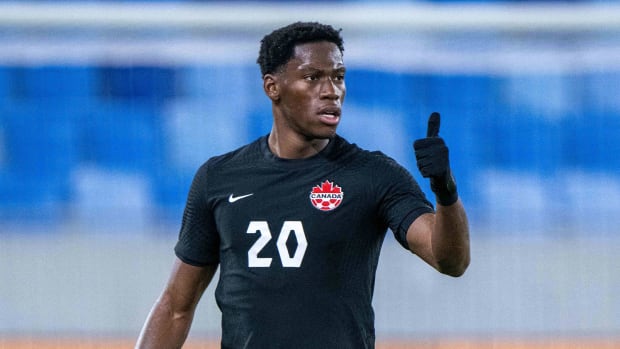
Sebastian Frej/Imago Images
It matters that David’s “visceral experience” came in Canada, the country that welcomed his family and became his second home. He still speaks with echoes of a Haitian accent, and he remains involved in charitable initiatives that support the nation where he spent his early childhood. The bios on David’s social media accounts include both the Canadian and Haitian flags. But he says he still holds a U.S. passport, and it was around the time he moved to Gent that his American origin opened yet another potential path.
David played for Canada at the 2017 Concacaf U-17 championship, where his team failed to get past the group stage. A U.S. squad featuring Tim Weah, Josh Sargent and James Sands fell to Mexico on penalty kicks in the final. Shortly thereafter, U.S. U-20 coach Tab Ramos was on the phone with Mavromaras. Although both countries were going to miss the ’18 World Cup, the Americans had qualified for the previous seven. Canada hadn’t gone since 1986, 14 years before David was born. At the end of 2017, Canada’s men were ranked 94th—worse than when David arrived in Ottawa. It was a global football afterthought, and the U.S. appeared to be David’s best shot at the ’22 World Cup by far (both will qualify automatically in ’26).
“This was when I was starting off in Belgium with [Gent’s] second team, and so it was just about getting me to a U-20 camp with the U.S. And I wasn't totally against it,” David says of his agent’s conversation with Ramos. “I said, ‘You know, I haven't made a choice yet, so why don’t I just see what goes on over there and how it’s like? But then, there was reflection that I was just going to start playing with [Gent]. I didn't want to go to the [U.S.] camp and miss games, and having to come back and maybe fight for my spot. So that was why ultimately I didn't go to the camp.”
Then there was further reflection. He’d been in Canada’s system, and there was another teenager from Edmonton, Liberia-born Alphonso Davies, who was just 10 months younger and coming along as well. They first played together at a U-15 identification camp in early 2015. The sports landscape was changing. Demographics were in soccer’s favor on both sides of the border. Not only were MLS academies starting to bear fruit, but European teams were realizing there were bargains to be found in North America. So David put his faith in that potential. Once again, he’d take the longer odds.
“Maybe it looks like a long shot, but I could also feel that Canada was growing,” he explains. “I didn't know it was going be that fast and to that level, obviously. But I knew that Canada was growing and had good players. Maybe we just couldn't find them all over yet. But I knew something was coming.”
There was genuine and understandable emotion involved as well.
“There’s a lot of people that brought up that point to me,” he says of Canada’s reduced World Cup prospects. “They’re not wrong. But I told them I want to make my own story, my own pathway. I want to make the story with Canada that [we can] qualify for the World Cup.
“With Canada it would be a special story. I spent so many years there—grew up there. So in the end it only made sense.”
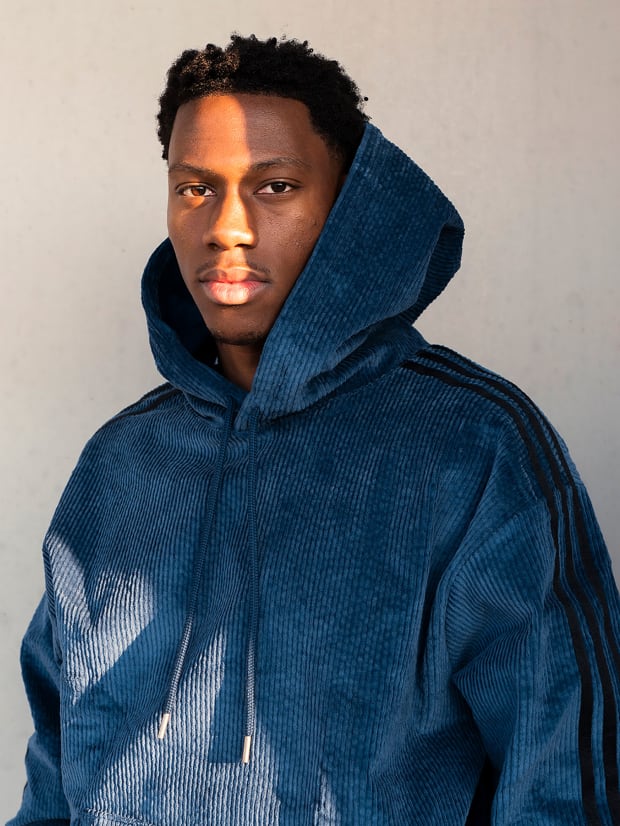
Adidas
David made his senior Canadian debut in a September 2018 Concacaf Nations League game against the U.S. Virgin Islands and, naturally, scored twice. That was where Canada was at that time—playing Nations League preliminaries against Caribbean minnows and, once World Cup qualifying began in March ’21, kicking off months before the favorites in a group featuring the likes of Bermuda and Aruba.
But every one of David’s decisions paid off. He quickly adjusted and then blossomed at each new level. He’s fast, alert, technically gifted, comfortable in front of goal and finishing with both feet, and has the tactical acumen to thrive in just about any attacking formation. With Canada, he’s played alongside Cyle Larin in a 3-5-2 or 4-4-2, alone atop a 4-2-3-1 or wider in a 4-3-3. He quickly became indispensable and in 2019, David was named Canadian player of the year after scoring six times at the Gold Cup.
“He’s always showed up—always showed up to every single game, whether we’ve played in Haiti, Saint Kitts, wherever we’ve had to go. He’s never shirked that call, and I think that tells you a little bit about why he’s successful,” Herdman says. “There’s a real passion behind his desire to perform for club or country. And his humility, he doesn’t see himself bigger than anyone else. He just is a guy that loves the game, loves competing and I think more importantly, loves representing Canada.”
David’s stature and fortunes soared over the next couple of years. His mother, Rose, died in late 2019. Her loss was by all accounts a deeply difficult moment for the young man, but it also somehow seemed to narrow his focus even further. In the eight Pro League matches between New Year’s and the suspension of play in March ’20, David tallied nine goals. He tied for the circuit’s golden boot, and that summer he earned a €30 million transfer to France’s Lille. It was the most ever paid for a Canadian player, including Davies.
David then helped author two improbable tales. In 2020–21, Lille stunned the sport by ending Paris Saint-Germain’s reign atop Ligue 1. He notched 13 goals during Les Dogues’ championship campaign, including the opener in the 2–1, title-clinching win at Angers on the final day of the season. Thirteen was a record for a Canadian man in a “Big Five” European league. David then transitioned quickly into the eight-team final round of Concacaf’s World Cup qualifying competition. Canada, ranked 59th in the world and fifth in Concacaf at the time, earned a shock 1–1 draw at the U.S. in early September and was unbeaten through its first 11 matches. David scored five times as the Maple Leafs qualified for Qatar with room to spare and finished atop the Octagonal standings, ahead of Mexico on goal difference and three points above the U.S.
He had written that special story. Colleagues back at Lille, apart from his past and present Concacaf rival and fellow New Yorker, Weah, didn’t know what to make of Canada’s success, David says. Americans are frequently asked about soccer’s status, improvement, structure and trajectory back home. The world knows that, on some level, the U.S. is invested, and interested foreigners likely are somewhat familiar with where the sport stands. The Canadian game, at least until World Cup qualification was secured, was barely on the map.
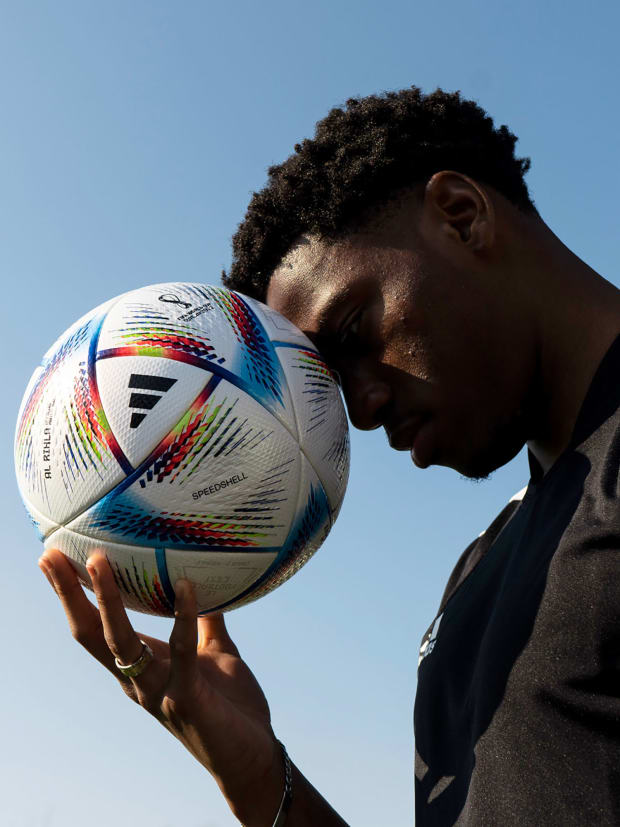
Adidas
“I don’t really get asked a lot about my nationality or soccer in Canada really,” David says. “Every time I go play, [Lille teammates] asked me, ‘Oh, who did you play against?’ After that they make fun of me. … I don’t think they respect as much the opponents that we play.”
Journalists, he says, “don’t really get deep into the subject, really.”
Few outside Canada are quite sure what to make of this team that seemed to emerge from the ether. Because of its long production cycle, Nike wasn’t even prepared to provide new uniforms for the World Cup. The Maple Leafs will be the only team in Qatar wearing old kits. It’s a fitting symbol for how far they’ve come so quickly.
“I think no one expected it, except maybe from us, because we knew the thought that we had on the team and what we’re capable of. So in a way, it’s understandable. But we knew,” David says.
They’ll face European power Belgium and 2018 finalist Croatia, two of the World Cup's most experienced sides, and then Morocco, Africa’s second-ranked team, during the group stage. It’s a tough slate.
“The cold, hard truth of Concacaf is it’s a different jungle to the world stage. ‘This is a different step up, gents, and these last four years we haven't really prepared you for that step up.’ Playing in Concacaf every single window, it just doesn't prepare you,” Herdman says.
But Canada will have Davies, who appeared to escape the worst of a hamstring injury suffered in early November. It will have a flexible yet sturdy team that’s been tough to break down, as well as a manager who consistently seems to get the most out of a squad without a ton of top-tier pedigree. And it will have one of the most sought-after young strikers in the world, who’s under contract with Lille until 2025 but who’s been linked to the likes of Arsenal, Manchester United and both Milan clubs, among others. David had nine goals in Lille’s first 11 Ligue 1 games this season. He's already Canada's No. 2 all-time scorer. Neither the potential of a high-profile transfer nor the pending World Cup has distracted the Iceman.
“I don't really think a lot about [the World Cup] because I don't really have the time to think about it,” he says.
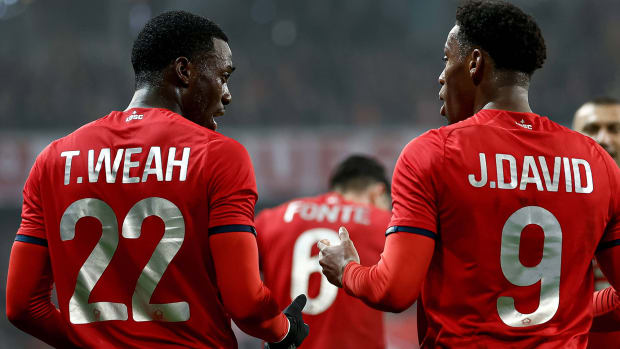
Panoramic/Imago Images
It’s come up with Weah a couple of times, but only in passing. David says that Weah has invited him to visit their mutual birthplace and get to know NYC a bit better, but the U.S. winger hasn’t given David a hard time for choosing Canada. The U.S. roster will feature more recognizable names than Canada’s, and more men playing for some of football’s biggest clubs. But there’s a lot of uncertainty surrounding the striker position, and it’s quite likely that the most lethal American finisher will be suiting up for Canada in Qatar. It’s another unlikely passage in one of this World Cup’s most unlikely stories.
The probabilities don’t bother David. Navigating narrow pathways to success is his specialty.
“I think that with how difficult our group is, we [still] believe that we can make it out of the group and ultimately make a good run at the World Cup,” he says.
But regardless of the results this month, he’s helped put Canada on the soccer map, while improving the odds for those coming after him.
“People are seeing different ways that other people made it and it makes them believe that if they did it, we can do it, too,” David says. “So it’s building this pathway for kids to see and believe in, and to keep fighting because there’s a lot of talent but at some point, when you don’t see the path, where you don’t really see a way to make it, you just go do other things. But I think now that you’ve created this pathway, people are getting more into soccer and believing more, and that’s why you’re seeing now more players coming out of Canada. And for sure, in the future, you’ll see a lot more.”







